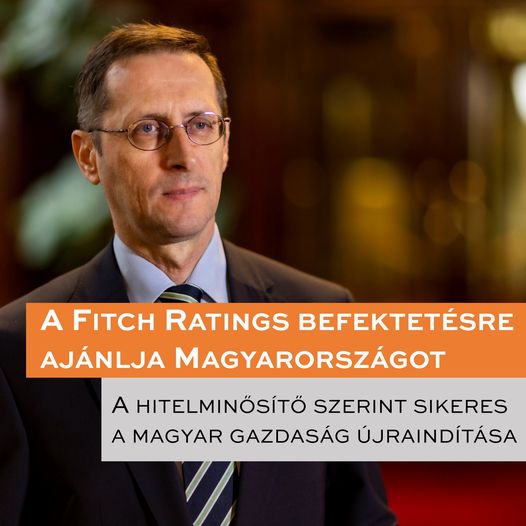With an unchanged stable outlook, the international credit rating agency Fitch Ratings has confirmed the "BBB" investment grade of Hungary's long-term public debt obligations denominated in foreign currency.
According to the rationale for the decision announced in London on Friday night, the stable outlook for Hungary's sovereign rating reflects Fitch's expectation that the growth of the Hungarian economy, which is recovering at a stable pace from the coronavirus epidemic, will be permanent, and that the public debt ratio will also stabilize in the coming years as a result of budget consolidation. Fitch Ratings announced that in the 2022-2023 period, it expects an annual average real growth of 4.4 percent in the Hungarian economy - a rate that exceeds the growth potential. According to the analysis, the "BBB" classification of Hungarian public debt obligations reflects that the structural indicators of the Hungarian economy are strong compared to other economies with a similar classification. The grade is also supported by stable growth fueled by investments, according to Fitch's analysis in London.
At the same time, the credit rating agency adds: among the factors of the "BBB" classification are the high public debt, the series of "unorthodox" budget and monetary measures in the past, and the fact that government metrics have deteriorated in previous years. Nevertheless, Fitch stresses that it expects the recovery fund announced by the European Union under the name Next Generation EU (NGEU) to mitigate the economic effects of the coronavirus epidemic to have a significant stimulating effect on the Hungarian economy from the second half of this year. The credit rating agency points out that its payment depends on the resolution of legal disputes.
However, according to Fitch's expectation, after the parliamentary elections in April, Hungary will initiate negotiations with the European Commission on the issue of rule of law disagreements in order to receive the first disbursement from the European Union's financial instrument for recovery and resilience (RRF). The credit rating agency stated that its growth forecast also includes the stimulus that the personal income tax refund for families with children will have on the Hungarian economy. According to the calculations of Fitch Ratings, this can stimulate the consumption expenditures of the household sector to the extent of 1.1 percent of the domestic gross product (GDP).
Mihály Varga called Fitch Ratings' decision good news on his social media page. The Minister of Finance indicated: in the report of the credit rating agency, they write favorably about the performance of the Hungarian economy, they expect strong growth and improved balance indicators in the next period. The head of the portfolio reminded: Moody's upgraded Hungary last September, so with the work of the past decade, our country has reached the point where it is recommended for investment by all three major credit rating agencies, even after a crisis. "Nowadays, not only investors, but also credit rating agencies trust the Hungarian economy," he added.
Source and full article: PestiSrácok
Featured Image: Facebook













